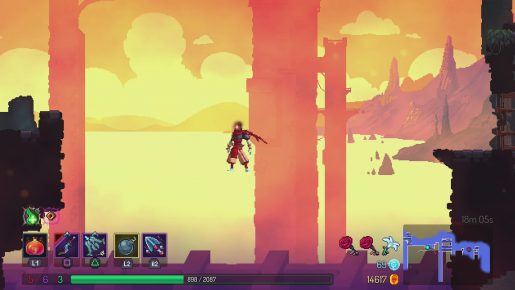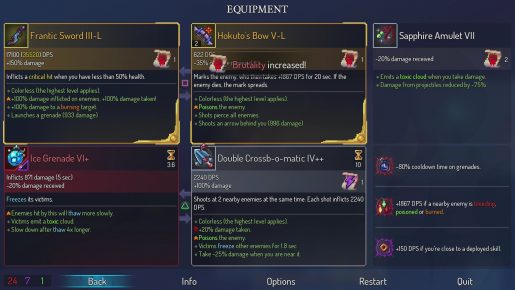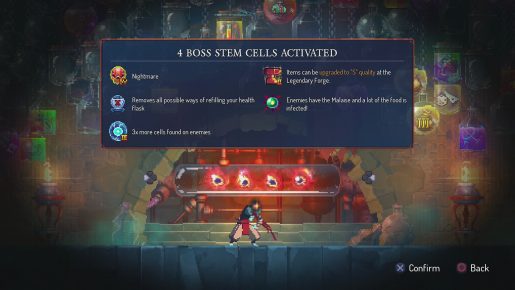Roguelike is essentially the single player version of multiplayer. Even if the core experience is the same, every encounter depends on a variety of factors, making each experience unique. This worked well for The Binding of Isaac and Enter the Gungeon, with Dead Cells trying to apply the formula to a melee setting. With a variety of items, secrets, optional paths and challenges, is it the next big roguelike or does it miss the point?
Dead Cells doesn’t have much in terms of story, with all of it being told through playthroughs and RNG. Certain rooms and situations will randomly appear, offering dialogue that explains this or that, with an adventure that ends with you facing the king and all subsequent runs changing based off the choices you make. It’s the type of thing that is interesting, assuming you want to piece it all together, with it being vague enough to make the setting interesting. Naturally, this leaves the gameplay to do the heavy lifting.
Part of what makes Enter the Gungeon and The Binding of Isaac great is there are countless items, many of which are amazing or useless depending on the situation, with it falling on players to make the most of whatever they get. This can make an entertaining gameplay loop. Sometimes you’ll be impossibly strong, other times exceedingly weak, with the deciding factor being how well you play. Dead Cells puts this behind two grind walls and makes it optional.
At first players will have a small handful of items to make use of. Some are good, at least one is great and the rest suck. Every enemy has the potential to drop certain blueprints, an item that can be brought to the forge and unlocked in exchange for a predetermined amount of cells, which determines what items can and can not appear. This doesn’t apply to legendary items but is true for the most part. So, if you don’t think this or that is useful, simply opting out of it prevents it from appearing. This means players can limit their pool to only the best items, ultimately removing the need to make due with terrible weapons. Weapons can also be rerolled, so simply getting a strong weapon is often enough to come out ahead.
From there, the final boss and your overall build has a substantial impact on how things play out. On earlier runs I had a more well rounded build, since it made sense to have enough health to take a couple hits, though this will leave players weak against the final challenge. I later discovered going all in on power, namely tactics, was enough to make the final challenge a joke. In fact, enough power could turn any challenge into a joke.
This is what makes Dead Cells so frustrating. There are a lot of skills, some of which are hidden behind well crafted puzzles or extremely difficult feats, yet only two or three of them are really useful and one build dominates all others. Similar things are true for weapons. Ice is arguably the easiest ways to overcome any challenge and there is no need to try other weapons when turrets dominate everything.
Perhaps the best way to understand the issue is to look at something like Demon’s/Dark Souls. Even if there are more difficult ways to play, does it still have any charm if you start off with a light saber and instant kill gun? Yeah, I can invest more time and effort to give me more variety or purposefully build myself in a way that makes the game artificially difficult, but these are choices that hold true for any game.
In addition to eventually hitting a point where health and difficulty are a non-factor, it doesn’t feel like a complete experience. Some things, such as the door at the start of the game and another that requires a currently unobtainable fifth boss cell, show that there is work to be done. Both of these things are planned for the future, as is another boss that rounds out the alternate boss path, making it a full release in name alone.
Verdict
Dead Cells is probably one of the hardest reviews I’ve ever written. On one hand, I originally loved the game and would’ve given it an Editor’s Choice/9+, but on the other hand, so much of what I loved stemmed from me playing in a less than ideal way. The issue becomes, is the ability to reduce the difficulty to nothing enough to ruin the overall experience or is the core experience good enough to make up for the fact there are massive balance problems?
While I would love to definitively say one over the other, what I can say is, despite the flaws, it is a fun game to play. Learning how to overcome every foe, be it crouching to avoid arrows or waiting for the perfect moment to dodge, is a fascinating journey, with some of the enemies offering various challenges. Higher difficulties might not change the core experience but it does make different items useful and forces players to reevaluate their choices. Even at my strongest I had to change my tactic or approach in a number of situations to overcome that challenge. Given that and so many of the things I figured out others might not pick up on, it’s hard to hold the flaws against Dead Cells too much.
I suppose to comes down to this, if you’re looking for an easy version of Enter the Gungeon or a game where you have to plan every encounter, you’ll love Dead Cells. However, if you want an experience where you absolutely have to make the most of what RNG gives you, it might not be for you.
[Editor’s Note: Dead Cells was reviewed on PS4 platform. The game was provided to us by the publisher for review purposes.]



